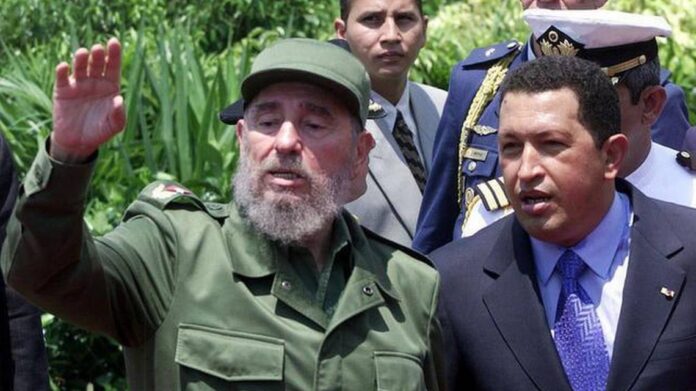The scenario is repeating itself. In Cuba, the Castro revolution has lasted for 60 years, while in Venezuela, the regime supported by Havana approaches 26 years. Various analysts have speculated about the downfall of Fidel Castro, Hugo Chávez, and now Nicolás Maduro, who has held power since 2013.
In reality, Fidel Castro passed away revered by his communist followers, political figures of all stripes, and with blood on his hands. He never faced justice for his crimes. Upon his death, he left his brother Raúl, who has no intention of surrendering power. In Venezuela, the late Hugo Chávez bequeathed his legacy to Nicolás Maduro, a leader lacking education, ethical standards, and certainly no scruples.
Amidst lies, illusions, false battles, and a war on social media awash with misinformation—where the truth is the real casualty—Venezuela struggles to find a way out of its grim fate, still unable to unlock the solution. Most of its irresponsible society seems to be waiting for a miracle from Uncle Sam to swoop in, arrest Maduro and his accomplices, and end the chapter.
In Venezuela, there are no mourners; chavismo has morphed into a metastasis of the cancer created by the political parties that dominated the landscape for 40 years of democracy. Political hordes have emerged that care little for the country or its issues, primarily interested in stuffing their pockets and enjoying the spoils of power. This elite controlling Miraflores has garnered support from fake businesspeople, supposed academics who became complicit in their excesses, military figures devoid of morals, and leaders who sold their souls for a contract.
These political hordes, twisted by an outdated and corrupt oil model, have no limits to their ambitions. They betray, negotiate with the regime, and conduct business without remorse, indifferent to the impact on the masses. Their primary objective is to create a bubble where they indulge in luxury and fully enjoy life, portraying a country that has risen from the ashes.
However, the false bubble reveals only a façade of a flamboyant Venezuela with illusory wealth—a nation in ruins that produces little, its demand primarily stemming from remittances and money laundering linked to drug trafficking and corruption. On social media, the false conflicts generated within the regime circulate, depicting an imminent fall driven by the military might of the United States in the Caribbean, which has seen six boats sunk, some with outboard motors, and a claimed reduction in the flow of drugs toward the decaying U.S. market.
This military report, as noted by American researcher Christopher Sabatini (NYTimes 1-10-2025), is unwarranted because Venezuela is not one of the main suppliers of illicit drugs to the United States. The cocaine from Venezuela counts for very little of what enters the U.S., and the country hardly plays a role in the fentanyl trade, according to the Drug Enforcement Administration.
The underlying goal of Donald Trump’s government is to instate a change by applying military pressure. However, it’s important to recognize that the mafia controlling Venezuela has few options for survival if they relinquish power. The U.S. President previously attempted this shift during his first term and failed. It is true, as Sabatini posits, that he can deploy drones to target strategic points to intimidate while minimizing human sacrifices. The aim is to avenge the humiliation faced due to the failure of Juan Guaidó and the lack of mobilization among the opposition and military in 2019.
Changes in Venezuela exist solely on social media; daily, journalists operating mostly from abroad showcase a country that does not exist. Even among opposition factions, confrontations are brewing for non-existent power or resources allocated by certain agencies. Their reporting is rife with bias, speculation, and many lack moral standing as they were complicit in the parties that caused the national disaster and ushered in the chavista regime.
Internally, the opposition has faded. Business dealings with the regime have become common, and credibility is non-existent. Daily life appears normal, with even national universities seemingly stable. A citizen recently recounted that the Central University is a marvel, and Zulia University (the second most important) takes pride in ranking fifth among national universities. In other words, everything seems to be going fine despite the exodus of researchers, students, and the degradation of research centers and facilities. If the situation is so good, then why change Maduro?
During vacation periods, hotels in the Andean region are filled with tourists, as well as beaches near Caracas or in Falcón state. Restaurants and liquor stores are packed on weekends, and the scandals involving opposition leaders “jumping the fence” show them splitting contracts with their counterparts from the United Socialist Party of Venezuela, as seen with leaders like Henrique Capriles of Primero Justicia, Henry Ramos Allup of Acción Democrática, or former president José Luis Alcalá of Un Nuevo Tiempo.
It has been 26 years of regime, with Maduro holding power for 12 of those years—killing, stealing, and violating national and international justice without facing any condemnation, neither for himself nor for his accomplices. They have mastered the art of controlling power, deceiving, lying, and repressing, following the historical pattern set by their Cuban counterparts to mock the United States, Europe, and Latin America. They understood in 2015 that power is not shared and that money rules all. The transformation of the opposition into hordes exemplifies the saying that “money talks.”
Perhaps, as Sabatini suggests, Trump may instill fear among regime members by indicating that “their days are numbered.” The tragedy of this solution is that Venezuela’s future will remain in foreign hands, and its irresponsible society will still be, a century later, reliant on oil.
Cupertino Flores
